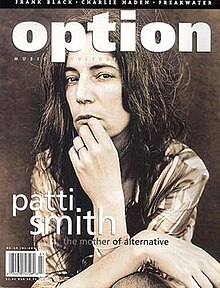Option (music magazine)

Issue #69, July/August 1996.
|
|
| Executive editor | Scott Becker |
|---|---|
| Categories | Music magazine |
| Frequency | Bimonthly |
| Circulation | 14500 (1989) 27000 (1995) |
| Publisher | Scott Becker |
| First issue | March–April 1985 |
| Final issue — Number |
July–August 1998 81 |
| Company | Sonic Options Network Supersonic Media Inc. |
| Country | United States |
| Language | English |
| ISSN | 0882-178X |
Option (subtitled Music Alternatives, then Music Culture) was a music magazine based in Los Angeles, California. It covered independent, underground and alternative music and multiple musical genres for an international subscription base. Its print run began in 1985 and ended in 1998.
Originally called OPtion, it, along with Sound Choice, were the dual successors to the earlier music magazine OP, published by John Foster and the Lost Music Network and known for its diverse scope and the role it played in providing publicity to DIY musicians in the midst of the cassette culture. When Foster ended OP after only twenty-six issues, he held a conference, offering the magazine's resources to parties interested in carrying on; attendant journalist David Ciaffardini went on to start Sound Choice, while Scott Becker, alongside Richie Unterberger, founded Option. Whereas Sound Choice was described as a low-budget and "chaotic" publication in spirit, Option was characterized as a "profit making operation" right at the start, meant to compete with the newly founded Spin.
The magazine began as a small press publication, described by the New Music Periodicals review of the Music Library Association as "encompassing rock, jazz, classical, and electronic forms".The New York Times noted its dedication to coverage of indie music releases, with each issue containing "hundreds" of reviews: "not all rock by any means, but it's hard to imagine the existence of Option before punk rock." The magazine used 40-50 unpaid reviewers at a time, few of whom were professional critics.
One given issue's musicians profiled included "New Orleans's proto-jazz outfit the Dirty Dozen Brass Band and bluesman Walter "Wolfman" Washington; Indian pop-traditionalist Najma Akhtar; vanguard composer and pianist Cecil Taylor; Yugoslavia's ideological rockers, Laibach; Texas R&B veteran Doug Sahm; Brit dance funkateers Wolfgang Press". According to Becker, the editors conscientiously debated as to whether cover subjects such as Frank Zappa and Siouxsie and the Banshees were "too well known".
...
Wikipedia
